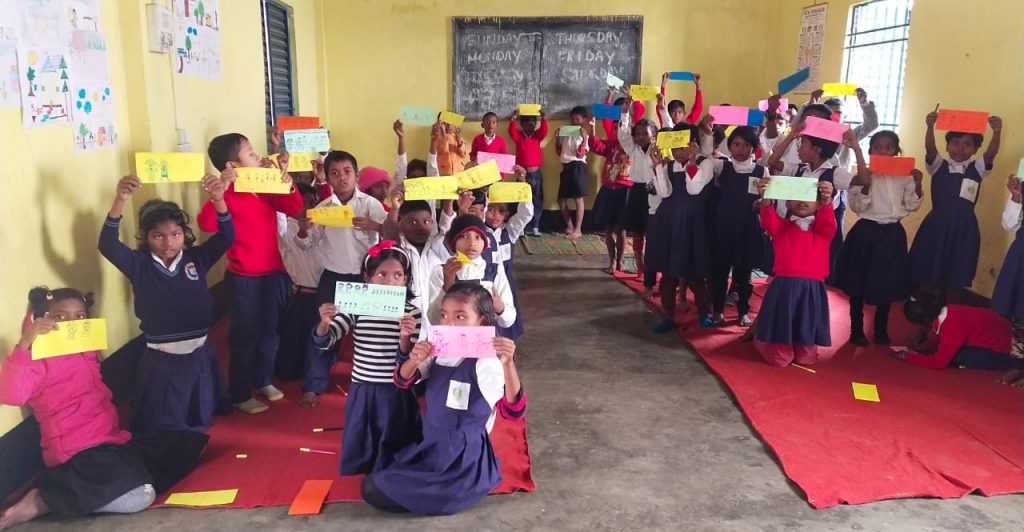JEEVAN PATH
It is evident from the fact, revealed from several studies during COVID and post-covid situation that children mostly from the marginalised background have discontinued their school education. The reasons being multidimensional, but overarching was being the learning loss as the online education reached only to a handful of children, due to lack of connectivity and availability of devices issues.

Having understood the situation, which was so deplorable, SPAN designed and introduced ‘JEEVAN-PATH’ as relevant Education and Learning for Life and from Life as well.
This thought, however, is borrowed from “Education that is transformational”, It is the liberating education envisaged by Tagore’s Shantiniketan of the 1930s, Gandhiji’s Nai Taleem of the 1940s, and the vision of education as a force in nation- building and social transformation of dalits and minorities articulated by Ambedkar, Nehru and Maulana Azad in the 1940s and 1950s.
The objective of education is its role in social mobilisation and transformation directed specifically at questions of caste and gender asymmetry and minority empowerment and also fostering democracy as a way of life; inculcating a respect for constitutional values of plurality and secularism in children; promoting decentralisation to facilitate generation of locally relevant knowledge and curriculum practices; sensitisation to environmental issues; and broadening of the scope of curriculum to include traditional crafts, work and knowledge.
Ensure that learning is shifted away from rote methods, enriching the curriculum to provide for overall development of children rather than remain textbook centric, making examinations more flexible and integrated with classroom life and nurturing an overriding identity (Teacher and students belong to the different caste, creed, religion, and gender identity) informed by caring concerns within the democratic polity of the country.
SPAN’s initiative on the process of mitigating the learning loss due to Covid – 19 and strengthening the existing school education system due to impact of the COVID-19 pandemic on education, which is both unprecedented and widespread in education history.
In five districts e.g. in Kolkata, South 24 Parganas, Purulia, Jalpaiguri and Alipurduar SPAN's staff and volunteers would now work with children, teachers, youth, parents, and community around 14 government primary schools.
Regular workshops with children, youth, and teachers in primary school on language, Math and environment are being organised to boost the knowledge, skills, and practice and fill the learning gap in a fearless environment where rote learning is completely discarded.
Jeevan Path is a process that ascertain child’s impulsiveness to learn. The Jeevan path sessions will be facilitated for meeting twin objectives. First, the child should learn innovatively to fluently read, write correctly, comprehend, and solve appropriately. Second, the child will connect to the world next to his/her immediate environment.
The enabling will happen 1) innovatively through children’s involvement in projects, (these projects will be developed locally by mentors and involving local youth, in workshops) which is made keeping the context and local culture in mind. Children, however, will be able to grasp the knowledge, and will evidently participate to learn, 2) through collective learning, which may be organized around the life and livelihoods of local populace, where collective knowledge is reinvented to make it become a content of learning, revealing the fact that everyone contributes to knowledge creation and learning, 3) craving in imaginary character resembling someone, who matches the child’s experience and children are engaged in dialogue through letters and other forms of communication, and finally, 4) around online presentation.
That is how children’s learning relates to school curriculum. This will help child to be active while learning rather than remain textbook centric and examination phobic. Thus, the children’s learning in classroom will be integrated with the environment outside and will restore school ecology (teacher-student, teacher-parents, parents-children, children-children) by caring concerns within the democratic polity of the country.
SPAN is also ensuring all the children returning and cent percent attendance of children by making door to door visits to spread awareness around education and related issues.
The young graduates and college goers as volunteers to take leadership in the process. They got the initial training. They will be participating in these Jeevan Path workshops and accelerate the learning process with the guidance of the local teachers. They will be the child rights defenders of their locality.
Besides, Jeevan Path truly adheres the principles and norms evolved from the National Education Policies of 1968, 1986, 1992 and Kothari commission Report. It also follows and tries to see RTE Act as the reality. SPAN has developed a detailed module for Jeevan Path by consulting several teachers.
It gives significant importance to the syllabus. However, it pays most attention to the learning of the children. The process of deriving examples from their environment and relating it to the syllabus will reduce the fear of examination and rote learning.
Jeevan Path was introduced not only for engaging children with school education for learning recovery due to Covid or the pandemic era, rather it hopes to contribute suggestively in the syllabus, curriculum, teaching-learning process and the school ecology.

